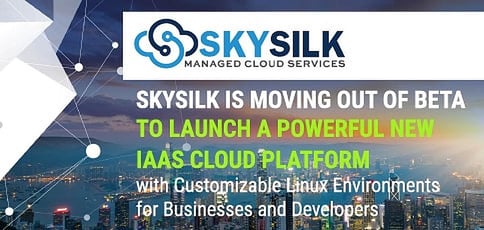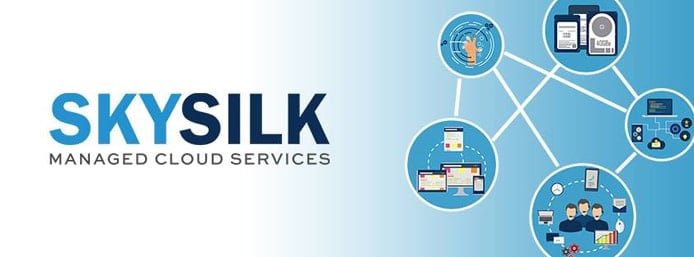
TL; DR: Building and maintaining infrastructure is expensive and time-consuming. As a result, many developers and organizations are turning to IaaS cloud providers to handle the cost and management of scalable, flexible infrastructure, so they can focus on their business missions. Enter SkySilk. The IaaS provider delivers a feature set driven by customers, a culture of human-driven support and advice, and a goal of being the most affordable hosting platform on the market. We recently sat down with SkySilk Marketing Strategist Steve Burke who told us how the new platform is set to give developers and businesses access to simple, reliable, scalable, and — most importantly — affordable cloud computing solutions.
Cloud computing has three main categories: SaaS, PaaS, and IaaS.
SaaS, or Software as a Service, allows users to access software hosted offsite by a third-party. Microsoft Office Online is an example of a widely popular SaaS application. The software allows users to enjoy all the benefits of Microsoft Office from a web browser — removing the need to install copies onto endpoints. SaaS is typically aimed at end users.
Platform as a Service (PaaS) goes one step further, enabling online, cloud-based application development, execution, and management without the need to build and maintain the infrastructure required for building and launching an app. End users aren’t the customers for PaaS. Rather, developers build their applications (which may be SaaS apps) on top of predefined platform infrastructures and configurations. AWS RDS (Amazon Web Services Relational Database Service) is an example of a well-known PaaS.
The third major category of cloud computing is the most advanced and most powerful for success-driven developers. Infrastructure as a Service (IaaS) provides developers with complete infrastructures, including multiple virtual machines and high-level APIs, so that applications become less dependent on underlying network infrastructure specifics and, thus, more scalable and flexible. IaaS offers developers the most control possible without hosting their own dedicated hardware. It’s also the most scalable of the three cloud computing categories and offers cost efficiency because computing resources, including RAM, storage, and bandwidth, are available in on-demand, pay-per-unit schemes with massive upper limits.
Building your own infrastructure isn’t cheap. If you’re a large business, it can cost upward of $100,000 to deploy a single cluster. The benefits of an IaaS come down to investment, time saved, and being able to leverage someone else’s infrastructure. It’s why IaaS is so popular these days. It not only saves developers potentially hundreds of thousands of dollars, but dev teams also don’t have to worry about maintenance.

SkySilk’s Steve Burke told us the company’s new cloud platform is set to change the IaaS space.
As a new player in the IaaS space, SkySilk is bringing something new to the game — starting with a customer-driven feature set.
“We’ve always been brainstorming different ways to differentiate,” said SkySilk Marketing Strategist Steve Burke. “We’re a startup, and we’re facing hurdles like the rest of the guys out there trying to compete. We’ve found the answers lay in quality assurance testing and communicating with our users to make sure we’re addressing their needs.”
Building a New IaaS for Cloud Development and Deployment
Steve told us that most everything SkySilk does revolves around listening to customer feedback.
“Of course, we have our basic plan of what we want to achieve with the platform, but a big reason we’re beta testing is to provide free resources to people in exchange for testing, and for people to provide feedback,” he said. “This helps us improve on the platform and know what potential features will be useful to add down the road.”
Though SkySilk is still in beta, the product is already packed full of an impressive set of services and features. And the toolbox is constantly being refined by actual customers using the IaaS.
Developers and small businesses currently using the service during the special invitation beta period are providing feedback and real-world insights to help Steve and his team hone SkySilk’s offering into a modern cloud infrastructure service optimized for the needs of growing businesses. The goal of the SkySilk Beta Cloud Platform is to offer public cloud, hybrid cloud, or private cloud deployment options that are truly customizable, flexible, and optimized.

SkySilk’s customer-focused philosophy has resulted in a robust and affordable IaaS perfect for developers and SMBs.
“We’re always looking to find new ideas from our users and within the company,” Steve said. “This allows us to continuously improve our product and potentially offer something the competition doesn’t.”
For Steve and the team, it’s all about quality. He told us they’re always testing new pushes of the platform and staging them.
“We understand that, as a platform begins to grow, one line of code can potentially mess things up,” he said. “So, we’re always making sure everything’s tight-knit. We’re always brainstorming ways to make sure the platform’s running fast and smoothly — whether that’s through building premium hardware or deploying clusters across the United States — and eventually the world.”
Just a Few Clicks to Dozens of Linux Turnkey Applications
Setting up a SkySilk ownCloud Virtual Machine literally takes only minutes, which is a key goal of SkySilk’s offering.
“We want to make our platform incredibly simple for users — especially those who may have never used something like a VPS or hosted a website before,” Steve said. “The analogy we like to use is ‘We’re the whiteboard.’ You can do anything you want with our platform. You can create the next Facebook or learn something like Node. It’s really versatile and has many different values. What you do with the platform is ultimately up to you.”
Although still in beta with additional features possible, SkySilk already delivers a robust IaaS. At the time of this writing, more than 25 turnkey Linux applications and operating system installs are available to SkySilk customers, including CentOS, Ubuntu, Debian, Fedora, Archlinux Base, Ruby on Rails, Jenkins, and Ansible. Also available are CakePHP, Moodle, MongoDB, MySQL, Magento, WordPress, OwnCloud, and OpenSUSE, among many others.
SkySilk is also a big proponent of the open-source culture and believes in leveraging the flexibility and transparency of open-source technologies to create simple, fluid, and secure customized cloud computing environments.
The open source server virtualization management solution Proxmox Virtual Environment enables SkySilk users to manage VPS, containers, highly available clusters, storage, and networks with an integrated, easy-to-use web interface. By utilizing Ceph clustered storage, SkySilk provides highly performant, fully fault tolerant replicated storage solution for its Cloud Platform. Ceph is an SDS, or software-defined storage, which is portable, has no hardware limits or requirements, and breaks many limits that traditional storage solutions have for deployment. LAMP Stack is also included for customers.
Additional open-source technologies standard in SkySilk’s offering include KVM (for kernel-based VPS), QEMU machine emulator and virtualizer, Open vSwitch virtual networking, and Icinga computer system and network monitoring. Offerings also include Grafana metric analytics and visualization suite, and InfluxDB time series database. LXC (Linux Container Technology) is also available for running multiple isolated Linux systems on a control host using a single Linux kernel. And Ansible, the software that automates software provisioning, configuration management, and application deployment works to improve the scalability, consistency, and reliability of SkySilk’s IT environment.
“You can create and install whatever you want in your own environment,” Steve said. “And it’s super simple. It’s just a few clicks. This is where we strive to differentiate.”
Building a One-Stop Shop for Development, Hosting, and Site Creation
Steve noted that the idea behind offering so many features and enhanced flexibility is to attract a wide range of user types and allow the platform to be employed for an array of use cases.
“We don’t just want to be a service people use,” Steve said. “We want to be a one-stop shop for development, hosting, website creation — everything like that.”
In addition to communicating directly with customers, SkySilk has created a discord server were customers and their teams can communicate with SkySilk staff and other customers. Participants can exchange ideas and code snippets as well as share the projects they’re working on using SkySilk’s platform or the website they’re hosting.

SkySilk gives users access to an array of Linux applications and developer tools.
SkySilk staff and other customers provide support within the discord server.
“We really just want to build a community and give people the opportunity to ask questions and feel welcome,” Steve said.
There’s even a suggestion box in the discord server where users can tell SkySilk what they’re looking for from the team, and how SkySilk can implement users’ requests.
That goal of offering more than a “service people use” is also furthered by SkySilk’s approach to customer support.
“We don’t have any bots — it’s all humans over here,” Steve said. “We focus heavily on providing personalized support. Our guys are always the first on top of things. My managers work tirelessly answering support tickets. We’re a smaller platform than a giant, like AWS, but support is one thing we never plan on falling short in. At the end of the day, our goal is to earn our customers’ trust.”
Starting at Just $1 and Paying with SkyPoints
SkySilk plans to leave beta and go live this summer.
“It’s always tough to know exactly when we’re going live since we’re always adding features,” Steve said. “But we’re closer than ever right now.”
Until then, all resources are free. Customers using the service while under beta are automatically given a single VPS virtual machine and 500GB of SSD storage per account, with more of either potentially available on a case-by-case basis. Additional features available at no charge include 8 CPUs, 8GB of RAM, one-click cloud LAMP Stacks, dedicated sandboxed environments, automatic backups and snapshots, and new platform OS templates.
But the budget-friendly resources don’t end after SkySilk goes live.
“One of our goals is to try to keep the platform affordable,” Steve said. “We don’t want anyone left out. We want to be able to offer this to anyone, small or large. We want to try to offer the most affordable hosting platform out there. We’ll have an option for people who are concerned about cost starting at just $1 per month.”
Steve told us SkySilk plans to give all beta users the opportunity to migrate their accounts to the live platform if they want to. And, with the SkyPoints reward system, paid plans can be even more economical.
“SkyPoints are like cash back,” Steve said. “100 points are worth $1. You can earn those by using your VPS and promo codes. These can be used for account credit or be placed into gift cards to places like Best Buy.”
To get in on the currently free SkySilk beta, visit skysilk.com and use the signup form at the top of the page to register. Registration also automatically includes 500 SkyPoints in your account.
HostingAdvice.com is a free online resource that offers valuable content and comparison services to users. To keep this resource 100% free, we receive compensation from many of the offers listed on the site. Along with key review factors, this compensation may impact how and where products appear across the site (including, for example, the order in which they appear). HostingAdvice.com does not include the entire universe of available offers. Editorial opinions expressed on the site are strictly our own and are not provided, endorsed, or approved by advertisers.
Our site is committed to publishing independent, accurate content guided by strict editorial guidelines. Before articles and reviews are published on our site, they undergo a thorough review process performed by a team of independent editors and subject-matter experts to ensure the content’s accuracy, timeliness, and impartiality. Our editorial team is separate and independent of our site’s advertisers, and the opinions they express on our site are their own. To read more about our team members and their editorial backgrounds, please visit our site’s About page.

